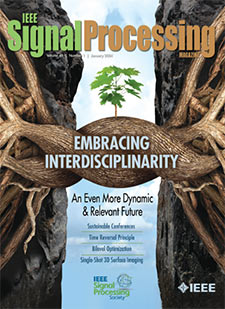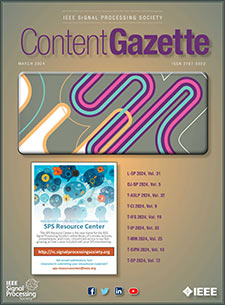- Our Story
- Publications & Resources
- Publications & Resources
- Publications
- IEEE Signal Processing Magazine
- IEEE Journal of Selected Topics in Signal Processing
- IEEE Signal Processing Letters
- IEEE/ACM Transactions on Audio Speech and Language Processing
- IEEE Transactions on Computational Imaging
- IEEE Transactions on Image Processing
- IEEE Transactions on Information Forensics and Security
- IEEE Transactions on Multimedia
- IEEE Transactions on Signal and Information Processing over Networks
- IEEE Transactions on Signal Processing
- IEEE TCI
- IEEE TSIPN
- Data & Challenges
- Submit Manuscript
- Guidelines
- Information for Authors
- Special Issue Deadlines
- Overview Articles
- Top Accessed Articles
- SPS Newsletter
- SigPort
- SPS Resource Center
- Publications Feedback
- Publications FAQ
- Blog
- News
- Dataset Papers
- Conferences & Events
- Community & Involvement
- Professional Development
- For Volunteers
- Information for Authors-OJSP
-
Home
An Exciting Juncture for Signal Processing Research: On Building Bridges, Challenges, and Opportunities
Conferences Events IEEE JSTSP Article IEEE Signal Processing Magazine IEEE TIFS Article IEEE TMM Article IEEE TSP Article Jobs in Signal Processing Lectures Machine Learning Seasonal Schools Signal Processing News SPM Article SPS Distinguished Lectures SPS Newsletter Article SPS Webinar SPS Webinars SPS Webinar Series Webinar webinars -
Our Story
What is Signal Processing?

The technology we use, and even rely on, in our everyday lives –computers, radios, video, cell phones – is enabled by signal processing. Learn More » -
Publications & Resources
-
SPS Resources
- Signal Processing Magazine The premier publication of the society.
- SPS Newsletter Monthly updates in Signal Processing
- SPS Resource Center Online library of tutorials, lectures, and presentations.
- SigPort Online repository for reports, papers, and more.
- SPS Feed The latest news, events, and more from the world of Signal Processing.
-
SPS Resources
-
Conferences & Events
-
Community & Involvement
-
Membership
- Join SPS The IEEE Signal Processing Magazine, Conference, Discounts, Awards, Collaborations, and more!
- Chapter Locator Find your local chapter and connect with fellow industry professionals, academics and students
- Women in Signal Processing Networking and engagement opportunities for women across signal processing disciplines
- Students Scholarships, conference discounts, travel grants, SP Cup, VIP Cup, 5-MICC
- Young Professionals Career development opportunities, networking
- Get Involved
-
Technical Committees
- Applied Signal Processing Systems
- Audio and Acoustic Signal Processing
- Bio Imaging and Signal Processing
- Computational Imaging
- Image Video and Multidimensional Signal Processing
- Information Forensics and Security
- Machine Learning for Signal Processing
- Multimedia Signal Processing
- Sensor Array and Multichannel
- Signal Processing for Communication and Networking
- Signal Processing Theory and Methods
- Speech and Language Processing
- Technical Working Groups
- More TC Resources
-
Membership
-
Professional Development
-
Professional Development
- Mentoring Experiences for Underrepresented Young Researchers (ME-UYR)
- Micro Mentoring Experience Program (MiME)
- Distinguished Lecturer Program
- Distinguished Lecturers
- Distinguished Lecturer Nominations
- Past Lecturers
- Distinguished Industry Speaker Program
- Distinguished Industry Speakers
- Distinguished Industry Speaker Nominations
- Industry Resources
- IEEE Training Materials
- Jobs in Signal Processing: IEEE Job Site
-
Career Resources
- SPS Education Program Educational content in signal processing and related fields.
- Distinguished Lecturer Program Chapters have access to educators and authors in the fields of Signal Processing
- PROGRESS Initiative Promoting diversity in the field of signal processing.
- Job Opportunities Signal Processing and Technical Committee specific job opportunities
- Job Submission Form Employers may submit opportunities in the area of Signal Processing.
-
Professional Development
-
For Volunteers
-
For Board & Committee Members
- Board Agenda/Minutes* Agendas, minutes and supporting documentation for Board and Committee Members
- SPS Directory* Directory of volunteers, society and division directory for Board and Committee Members.
- Membership Development Reports* Insight into the Society’s month-over-month and year-over-year growths and declines for Board and Committee Members
-
For Board & Committee Members
Popular Pages
Today's:
- Submit a Manuscript
- (MLSP 2024) 2024 IEEE International Workshop on Machine Learning for Signal Processing
- Information for Authors
- IEEE Signal Processing Letters
- (SLT 2024) 2024 IEEE Spoken Language Technology Workshop
- SPS Scholarship Program
- IEEE Transactions on Multimedia
- IEEE/ACM Transactions on Audio Speech and Language Processing
- IEEE Transactions on Image Processing
- IEEE Transactions on Information Forensics and Security
- IEEE Signal Processing Magazine
- Conference Call for Papers
- Information for Authors-SPL
- Signal Processing 101
- IEEE Transactions on Signal Processing
All time:
- Information for Authors
- Submit a Manuscript
- IEEE Transactions on Image Processing
- 404 Page
- IEEE/ACM Transactions on Audio Speech and Language Processing
- IEEE Transactions on Information Forensics and Security
- IEEE Transactions on Multimedia
- IEEE Signal Processing Letters
- IEEE Transactions on Signal Processing
- Conferences & Events
- IEEE Journal of Selected Topics in Signal Processing
- Information for Authors-SPL
- Conference Call for Papers
- Signal Processing 101
- IEEE Signal Processing Magazine
Last viewed:
- (ICASSP 2025) 2025 IEEE International Conference on Acoustics, Speech and Signal Processing
- Signal Processing at 75: More Dynamic and Pervasive Than Ever
- An Exciting Juncture for Signal Processing Research: On Building Bridges, Challenges, and Opportunities
- Going for Sustainable Conferences
- Learning From the Hidden Letters
- Statistical Principles of Time Reversal
- Publications & Resources
- IEEE Signal Processing Letters
- About IEEE Transactions on Signal Processing
- Signal Processing Cup
- Oymak, SametView (California Institute of Technology) “Convex relaxation for low-dimensional representation: Phase transitions and limitations” (2015)
- SPS Staff
- IVMSP TC Home
- (MLSP 2024) 2024 IEEE International Workshop on Machine Learning for Signal Processing
- Making a Good Feature Article Submission
Bing Hu, (University of California, Riverside) “Mining Time Series Data: Moving from Toy Problems to Realistic Deployments” (2013)
You are here
Newsletter Menu
Newsletter Categories
Top Reasons to Join SPS Today!
1. IEEE Signal Processing Magazine
2. Signal Processing Digital Library*
3. Inside Signal Processing Newsletter
4. SPS Resource Center
5. Career advancement & recognition
6. Discounts on conferences and publications
7. Professional networking
8. Communities for students, young professionals, and women
9. Volunteer opportunities
10. Coming soon! PDH/CEU credits
Click here to learn more.
News and Resources for Members of the IEEE Signal Processing Society
Bing Hu, (University of California, Riverside) “Mining Time Series Data: Moving from Toy Problems to Realistic Deployments” (2013)
Bing Hu, (University of California, Riverside) “Mining Time Series Data: Moving from Toy Problems to Realistic Deployments” (2013) Advisor: Eamonn Keogh
Data mining and knowledge discovery has attracted a lot of research interest in the last decade. Although there is extensive research in this area, the authors argue that most of the work is not as useful, since the datasets that they are dealing with and the methods that they proposed to solve the problems are more like ‘toy examples’ compared to the much more complicate real-world scenario. The authors have observed the following two problems that widely exist in most of data mining research. First, parameters will hurt the potential of spreading the ideas in the research community. In a lot of works, there are usually several parameters to tune in the proposed method. The authors claim that the parameter turning can kill the usefulness of an algorithm and reduce the number of citations. Second, the prevalently existed assumptions about the data further limit their application to solve the real-world problem. The authors strive to mitigate the above two problems. The contribution of this dissertation is as follows:
First, the authors demonstrate a parameter free framework using MDL to discover the intrinsic features of the data. With the intrinsic cardinality and dimensionality of the time series, the authors can further understand the underlying meaning of the data, before consulting the domain experts. In addition, the intrinsic features can be used as dimensionality reduction and have huge applications in the various lower bounding techniques. Second, the authors show a time series classification framework that has none of the prevalent assumptions. The authors propose to use the data editing technique to automatically build a data dictionary. In addition, our classification framework has the capability to say ‘I do not know’ at a certain point when classifying the incoming queries that does not belong to any concept in the training data. Our results show that a small fraction of all the data can achieve even better classification results than using all the data. In the last, the authors propose a dynamically weighted multi-dimensional classification framework, which can smartly choose the weight of each data dimension. The results over extensive datasets from various domains show that our framework is more accurate and robust to the occluded data.
For details, please visit the thesis page.
Open Calls
Conference News
Society News
Research Opportunities
Initiatives & Trends
Chapter & DL News
News & Announcements
- SPS Announces 2015 Class of Distinguished Lecturers
- New IEEE Internet of Things Initiative (IoT) Newsletter Announced
- TryEngineering.org Goes Mobile
- Introducing a Low-Cost Online Registration Tool for Conference and Event Management
- Member Discounts: IEEE Member Travel Discount Features Benefit Conference Attendees
- IEEE-USA Offers Free e-Books to Members in October, November, and December
- Member Loyalty Program Lets Sections Recognize Members for their Years of Membership
- vTools Release Announcement
SPS on Twitter
- DEADLINE EXTENDED: The 2023 IEEE International Workshop on Machine Learning for Signal Processing is now accepting… https://t.co/NLH2u19a3y
- ONE MONTH OUT! We are celebrating the inaugural SPS Day on 2 June, honoring the date the Society was established in… https://t.co/V6Z3wKGK1O
- The new SPS Scholarship Program welcomes applications from students interested in pursuing signal processing educat… https://t.co/0aYPMDSWDj
- CALL FOR PAPERS: The IEEE Journal of Selected Topics in Signal Processing is now seeking submissions for a Special… https://t.co/NPCGrSjQbh
- Test your knowledge of signal processing history with our April trivia! Our 75th anniversary celebration continues:… https://t.co/4xal7voFER
Home | Sitemap | Contact | Accessibility | Nondiscrimination Policy | IEEE Ethics Reporting | IEEE Privacy Policy | Terms | Feedback
© Copyright 2024 IEEE – All rights reserved. Use of this website signifies your agreement to the IEEE Terms and Conditions.
A not-for-profit organization, IEEE is the world's largest technical professional organization dedicated to advancing technology for the benefit of humanity.








